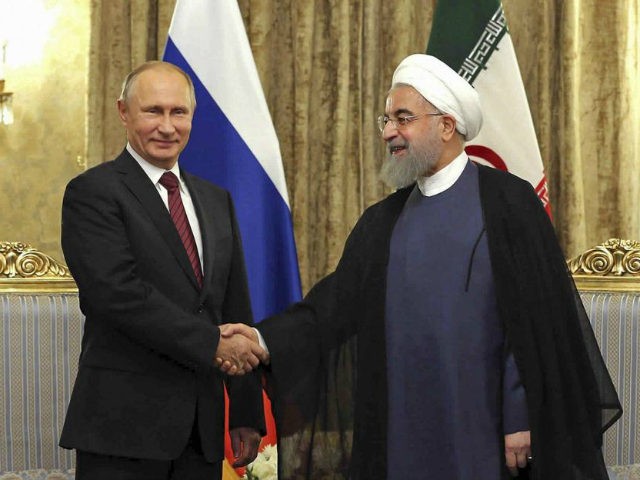Russia stressed that it plans to stand by its ally Tehran in opposing changes to the Iran nuclear deal amid the looming May 12 deadline for U.S. President Donald Trump to decide whether to reimpose sanctions on the Islamic Republic, a move that could imperil the agreement.
The Trump administration could pull out of the controversial agreement absent some changes to the pact, U.S. officials have said, to the dismay of its allies U.K., France, and Germany, which have suggested they do not intend to leave even if America pulls out.
Moscow indicated it would capitalize to enhance its relationship with Iran if the United States withdraws from the deal reached between Tehran and U.S.-led world powers, including Russia, in July 2015.
The deal is supposed to restrict Iran’s nuclear operations in exchange for relieving the Islamic Republic of crippling economic sanctions, namely those the United States and the United Nations have imposed.
However, Israel argues that the world powers entered into to the deal under false pretenses.
“The deal was made on a completely false pretense,” Sarah Huckabee Sanders, the White House press secretary, told reporters this week, echoing Israel. “Iran lied on the front end. They were dishonest actors. So the deal that was made was made on things that weren’t accurate, and we have a big problem with that.”
Vladimir Yermakov, the director general of the Department for Non-Proliferation and Arms Control at Russia’s Foreign Ministry, claimed the withdrawal of the United States would not necessarily end the pact, officially known as the Joint Comprehensive Plan of Action (JCPOA), Reuters reported.
“If the United States breaks an international agreement backed by U.N. Security Council resolutions, it will be the United States that should suffer the consequences. Neither Iran nor China nor Russia nor the European states should lose out,” Yermakov said.
“It might even be easier for us on the economic front because we won’t have any limits on economic cooperation with Iran. We would develop bilateral relations in all areas – energy, transport, high tech, medicine,” he added.
U.S. President Donald Trump has repeatedly criticized the agreement, threatening to pull out unless a follow-up agreement is reached to fix what he calls the agreement’s “flaws.”
Echoing Trump, Mike Pompeo told lawmakers when he was being confirmed for his post as secretary of state last month:
I want to fix this deal; that’s the objective. In the event that we conclude we can’t fix this deal … then the president is going to be given the best advice, including by me. If there’s no chance that we can fix it, I will recommend to the president that we do our level best to work with our allies to achieve a better outcome and a better deal.
…
Even after May 12, there’s still much diplomatic work to be done.
Russia has joined Iran in rejecting any proposed changes to the deal.
“We will not add anything to the deal or remove anything from it, even one sentence. The nuclear deal is the nuclear deal,” Iranian Iranian President Hassan Rouhani declared late last month, according to the Associated Press (AP).
“As long as our interests are guaranteed we will remain in the deal, whether the U.S. remains or not,” Rouhani also said, adding, “If our benefits are not guaranteed, we will not remain in the deal, no matter what the circumstances are.”
Both Iran and Russia are backing the murderous regime of Bashar al-Assad in Syria.

COMMENTS
Please let us know if you're having issues with commenting.